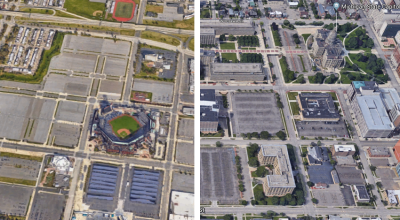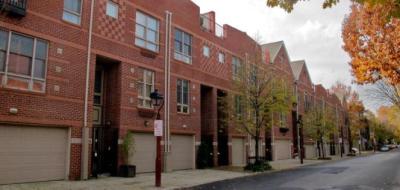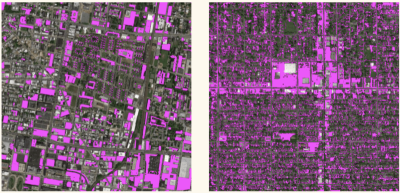New York Falls Behind Big Northeast Cities on Parking Policy
The city of Philadelphia recently released a draft of its new comprehensive plan, Philadelphia2035 [PDF]. The plan’s release makes New York the last city in the four largest Northeastern metro areas that hasn’t so much as stated a commitment to cutting back on off-street parking.
Philadelphia2035 calls for controlling congestion by adding parking maximums into the zoning code and pricing on-street parking high enough so that 15 percent of spaces are always free. Here in New York, we still pretend that adding off-street parking reduces traffic congestion.
At the same time, Philadelphia is moving forward with a brand new zoning code. According to an article by PlanPhilly’s Nick Gilewitz, the new code will eliminate parking minimums downtown and in the city’s many rowhouse neighborhoods. While Gilewitz notes that parking minimums will still require significant amounts of new parking in some relatively dense neighborhoods, he concludes that the end to many parking minimums “is a huge step forward in recognizing that Philadelphia has incredible public transit resources that can, and perhaps should, shape development.”
New York’s other Northeastern competitors, too, are trying to halt the overproduction of off-street parking and the subsidization of on-street parking. Boston’s equivalent of PlaNYC, for example, calls for raising meter rates and eliminating most free on-street parking by putting a price on residential parking permits. It also calls for expanding the area where new off-street parking is banned and cracking down on exemptions to the ban where it’s already in place.
In practice, as the city rezones, Boston is switching parking minimums in many neighborhoods to parking maximums, according to the editor of CommonWealth Magazine [PDF]. When directly involved in the development of large projects, Boston is pushing developers to turn entire floors of parking into housing.
Washington, D.C., meanwhile, is working its way through a citywide rezoning. According to Greater Greater Washington, “parking minimums would disappear in most cases,” with only the least transit-served neighborhoods keeping them. The Office of Planning’s draft language [PDF] includes city-wide parking maximums to “prevent an over-supply of off-street parking that would contribute to traffic congestion and the inefficient use of land.”
D.C.’s draft language also allows the city to grant exemptions from any remaining parking requirements if it can be shown that parking demand will be below the minimum, if the developer creates a plan to reduce driving to work, or if a project is near transit.
While it follows that the city with the best transit system and lowest car-ownership rate in the country would lead on parking policy, New York is instead falling further behind.




